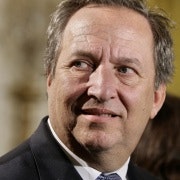Fed lessons from Summers' exit
Given his bleakening prospects, Lawrence Summers did the right thing in withdrawing from the contest to be the next chair of the Federal Reserve. It would have been an ugly fight that he might well have lost. Even had the Senate confirmed him, the process would have damaged confidence in the future of the Fed.
Summers showed grace to bow out before things got unmanageable. Alas, that spectre now dogs Barack Obama’s presidency. This week the Fed is likely to begin tapering its $US85 billion a month in quantitative easing – a key moment in the cycle. Whomever Obama selects to replace Ben Bernanke, it is vital he avoids further disruptions.
Whether it is Janet Yellen, the current Fed vice-chair, or someone else, the White House also needs to act quickly. Confirmations can drag on for months and Bernanke’s term expires at the end of January.
It must also act with far greater surety. One reason Summers went down was because the White House put his name out as their favourite but then did nothing to defend him from his rising chorus of critics. Most people assume Yellen will now get the nod. Either way, Obama must ensure her name is not suspended in limbo for too long. Lawrence Summers was felled by Democrats, who saw him as too close to Wall Street. Republicans could make life very difficult for Janet Yellen.
Above all, the White House needs to signal continuity. Ben Bernanke has done a good job guiding the US economy through an anaemic recovery having taken extraordinary steps to keep it afloat after the 2008 crash. In spite of the personality battles, the difference between the various names floated to replace him is minimal. All, including Yellen and Summers, agree that active monetary policy has been necessary to the recovery. Each is aware of the need for the Fed to be vigilant on the too-big-to-fail banks.
The FT’s chief concern is about the nomination process rather than the name. In short, Obama needs to step up his game. On Wednesday the Fed is likely to begin a cautious start to its QE tapering. The White House should not cut across that message. But as soon as possible thereafter, Obama will need to have produced his nominee.
The president will also need to back him or her up with a full-blown campaign on Capitol Hill. Presidents need to engage and persuade. That is the clearest lesson from the Summers debacle.
Copyright The Financial Times Limited 2013
















